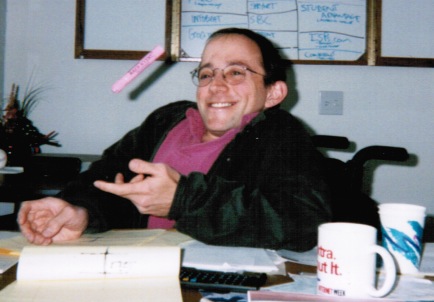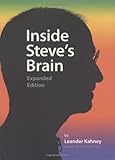57 Meditations on Kicking @$$ in Business and Life"4.8/5 stars" on Amazon
“Alienate the Non-Prospect” to Truly Dominate Your Market
Tweet CommentIs attracting people to your product always a good idea?
No!
No, attracting potential customers isn’t always a good idea because there is a cost to attracting certain prospects.

Apple is ok alienating 80%+ of computer prospects (represented by PC/Windows guy on the left) in order to attract hipper prospects like the Mac Guy (on right).
No comments yet | Continue Reading »
Sunday, December 9th, 2012
My Recent Speech On “Personal Branding” For AMA @ ING Cafe
Tweet CommentI gave a speech on Personal Branding to the American Marketing Association (San Francisco) (thanks, Brian Kerr!) on Nov. 20th at the ING Direct Cafe.
Some of you asked for the slides of the show.
Here’s the Powerpoint slide show via Slideshare and then below that are some notes from the speech:
No comments yet | Continue Reading »
Sunday, November 13th, 2011
Which Bands & Songs Steve Jobs Kept On His Own Personal iPod
Tweet 2 CommentsSteve Jobs favorite Grateful Dead song was Uncle John’s Band; and his favorite band was Bob Dylan, followed by the Beatles and then the Stones, according to Isaacson’s Steve Jobs book.
Isaacson outlines the below songs/bands that were on Steve Jobs’s own personal iPod.

Bono's U2 made the cut on Steve Jobs's personal iPod.
Here they are, roughly in order of which artist he had the most albums of: …
2 comments so far (is that a lot?) | Continue Reading »
Wednesday, October 5th, 2011
The Cool Secret Steve Jobs Asked My Friend Gary To Keep
Tweet 11 CommentsI’m sad today like millions of others, that the top inventor of our time, Steve Jobs, has died.
I feel very lucky that I got to interview Steve Jobs for an article I wrote early in my career (I can remember how excited I got when he called me directly to chat!). I more recently got to ask Steve and Bill Gates a question about entrepreneurship (see Bill Gates, Steve Jobs & Me).
But, I have a cooler Steve Jobs item to tell you about.
I want to share a story that Steve Jobs asked my friend Gary Brickman to keep secret years ago.

This is my old buddy Gary Brickman at CMP's/TechWeb's China Basin, San Francisco offices circa 1997 -- Steve Jobs asked him to keep a cool secret.
11 comments so far (is that a lot?) | Continue Reading »
Friday, October 22nd, 2010
3 Simple Steps To Help You Pursue Your Passion
Tweet 2 CommentsSteve Jobs told Stanford students that when he wakes up each day he tries asking himself:
“If this were my last day on earth, would I be happy with my to-do list.”

Steve Jobs told Stanford graduates that his to-do list needs to be good enough for his last day on earth
And if his answer is “no” for three or four days in a row, he does something about it.
Well, a goal in my life is to help people explore their passions, ideally in a way that helps them make a living.
I thought I’d share three steps that I used to further my own career passions.
Ok, so let’s dig in…
Step 1: Pick a Passion
It starts with picking a passion — your passion may be obvious to you ( politics, sports, medicine, photography religion) and you’re good to go.
If your passions are not obvious to you, ask those closest to you (friends, colleagues, family members) what they think. …
2 comments so far (is that a lot?) | Continue Reading »
Thursday, April 1st, 2010
Inside Tips From Apple & Steve Jobs
Tweet CommentI just finished reading a terrific book called Inside Steve’s Brain by Leander Kahney.
If you’re interested in Steve Jobs or Apple or technology or design, I highly recommend you read it.
I dog-eared a handful of pages of favorite bullets or quotes – here they are:
Beware the “Osborne Effect”
Jobs is careful to announce new technology (e.g. the Mac OS X) still under development before it’s ready to be sold…so as to avoid the “Osborne Effect”(named after the Osborne Computer Corporation) in which sales of existing technology or products being sold can be hurt.
The Osborne Computer Corp. took more than a year to get its next product available, ran out of cash and went bankrupt in 1985.
Borrowing Design Ideas Is Encouraged
The inspiration for the type of plastic case (a first for computers) for the Apple II came from Jobs seeing a Cuisinart food processor in the kitchen section of Macy’s.
Additionally, Jobs showed up at a design meeting for the Quicktime software product with a brochure from Hewlett-Packard with the H-P logo in a brushed metal.
The brushed metal ended up being adopted in across much of Apple’s software and some high-end hardware including the Safari Web browser and iCal calendar.
Design Tip: It’s More Important What You Leave Out Then What You Put In
Former Apple CEO John Sculley believed that a key part of Jobs’ greatness were decisions he made about things NOT to do.
Kahney points to an interesting study by Elke den Ouden, of the Eindhoven University, in which nearly half of products returned by consumers for refunds still work perfectly but new owners just couldn’t figure out how to use them.
Jobs and Apple are widely credited with keeping their product line lean and product functionality simple.
Another Design Tip: Functionality Is More Important Than How It Looks
Jobs explained in an interview with Wired in 1996 that:
“Design is a funny word. Some people think design means how it looks. But of course, if you dig deeper, it’s really how it worked. The design on fht eMac wasn’t what it looked like, although that was part of it. Primarily, it was how it worked…”
Apple’s Design Problem Solving
Apple designers subscribe to the “generate and test” approach to solving problems in which all the possible solutions are generated and tested to see if they offer a solution.
It’s key to use trial and error to make an “embarassing” number of solutions to get to one solution
Apple designers spends 10% of their time on traditional industrial design (brainstorming ideas, drawing, etc.) and 90% of their time working with manufacturing on implementing their ideas.
Jobs Doesn’t Believe In Focus Groups for Technology Products
He quotes the Henry Ford line: “If I’d asked my customers what they wanted, they’d have said a faster horse.”
The “Hero/Asshole RollerCoaster” Management Style
Kahney says he interviewed many people who work for Apple who say that the management style of Jobs and other Apple leaders is what is known as the “hero/asshole rollercoaster” in which there’s a constant tension at Apple between the fear of getting fire and a “messianic zeal” to change the world.
Apple’s Stock Plan
Apple employees can buy discounted stock of Apple in chunks based on their salary . The stock price is determined by the lowest price in the previous six months plus a small percentage discount.
Motives Are More Important Than Profits
“The older I get, the more I’m convinced that motives make so much difference,” Jobs is quoted in the book as saying.
“…our primary goal here is to make the world’s best PCs — not to be the biggest or richest.”
Great Steve Jobs Quote (from his 2005 Stanford commencement speech)
“Rembering that I’ll be dead soon is the most important tool I’ve ever encountered to help me make the big choices in life.
…have the courage to follow your heart and intuition. They somehow already know what you truly want to become. Everything else is secondary.”
I really recommend you read this book!
No comments yet | Continue Reading »
Wednesday, March 31st, 2010
How To Innovate: 5 Tips From The Top Innovators
Tweet 3 CommentsI was fascinated by a recent Harvard Business Review (HBR) article on how to innovate (an abstract is here with the option to purchase).
They researched such innovators as Apple’s Steve Jobs, Amazon’s Jeff Bezos, eBay’s Pierre Omidyar and Meg Whitman, Intuit’s Scott Cook and Proctor & Gamble’s A.G. Lafley.
Their key finding was that innovative entrepreneurs (who are also CEOs) spend 50% more time on five “discovery activities” than do CEOs with no track record for innovation.
I fully agree with these five tips for how to innovate; and want to provide my insights on them:
Five Tips On How To Innovate
1) Question (The Status Quo)
HBR points out that Michael Dell famously created Dell with the question:
“Why do computers cost five times the cost of the sum of their parts?”
Innovators are excellent at asking questions that challenge the status quo such as:
- Why not try it this way?
- Why do you do things the way you do?
- What if you tried this new thing or stopped doing some old thing?
- What would you do if failure was not an option?
2) Observe
Innovators are strong at observing people and details. …
3 comments so far (is that a lot?) | Continue Reading »
Thursday, May 7th, 2009
Bill Gates, Steve Jobs & Me
Tweet 5 CommentsI had the good fortune of interviewing Bill Gates and Steve Jobs (separately) early on in my career when I was a journalist.
On May 31, 2007, Jobs and Gates agreed to a rare appearance together onstage together at the All Things Digital (D5) conference at the Four Seasons Hotel Aviara, just north of San Diego. It was put on by the Wall Street Journal and felt like a rock concert!
I was lucky enough to attend and I couldn’t resist asking them their advice for entrepreneurs (as part of the question and answer section).
Here’s the video (and below that is the transcript) of Gates and Jobs answering the question (yes, that’s me being a bit nervous!).
[Beginning of Transcript of Q&A With Jobs, Gates]
Rob Kelly: I’m here with my business partner, we have a 100-person Internet media company, and I’m wondering what would be the single most valuable piece of advice you would give us to even attempt to create some of the value that you guys have done in both your very impressive companies?
Bill Gates: I think actually, maybe in both cases, correct me if I’m wrong, the excitement wasn’t really seen by the economic value.
Even when we were down at Microsoft in ’97, a computer at every desk and in every home, we didn’t realize that okay, we’re going to have to be a big company (laughter).
Every time, I thought, oh God, can we double in size…geez can you manage that many people…will that feel fun still, you know, and so every doubling, it was like, okay this is the last one.
So the economic thing wasn’t at the forefront, but the idea of being at the forefront and seeing new things, things we wanted to do, and being able to bring in different people who are fun to work with eventually with a pretty broad set of skills…and figuring out how to get those people with broad skills to work together has been one of the greatest challenges.
You know I’ve made more of my mistakes in that area than probably anywhere, but you know eventually getting there and some of those things work really well together.
I think it’s a lot about the people, the passion and it’s amazing that the business worked out the way that it did.
Steve Jobs: Yeah, people say you have a lot of passion for what you are doing, and it’s totally true and the reason is because it’s so hard that if you don’t any rational person would give up.
It’s really hard and you have to do it over a sustained period of time. So if you don’t love it, if you’re not having fun doing it, if you don’t absolutely love it, you’re going to give up.
And that’s what happens to most people, actually.
If you look at the ones that ended up being successful in the eyes of society, often times it’s, the ones that are successful love what they did so they could persevere, you know, when it got really tough.
And the ones that didn’t love it, quit. Because they’re sane, right? Who would put up with this stuff if you don’t love it?
So it’s a lot of hard work and it’s a lot of worrying constantly and, if you don’t love it, you’re going to fail.
So, you gotta love it, you gotta have passion.
And I think that’s the high order bid.
The second thing is, you’ve gotta be, you’ve gotta be a really good talent scout because no matter how smart you are, you need a team of great people.
And you’ve got to figure out how to size people up fairly quickly, how to make decisions without knowing people too well and hire them, see how you do, and refine your intuition,and be able to help build an organization that can eventually just build itself.
Because you need great people around you.
[end of transcript]
The video continues with a couple of other questions (I didn’t transcribe those) and I encourage you to watch the other videos of Steve Jobs and Bill Gates Together.
By the way, Steve and Bill share the same personality type — If you want to see more about that, go here: Bill Gates and Steve Jobs’ Personality Type

